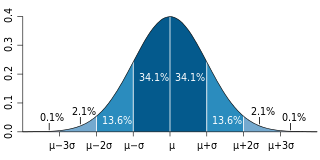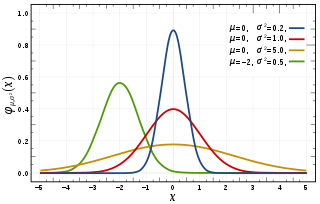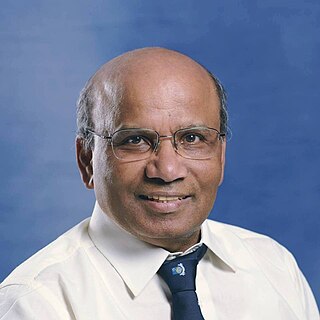Related Research Articles

In probability theory and related fields, a stochastic or random process is a mathematical object usually defined as a family of random variables in a probability space, where the index of the family often has the interpretation of time. Stochastic processes are widely used as mathematical models of systems and phenomena that appear to vary in a random manner. Examples include the growth of a bacterial population, an electrical current fluctuating due to thermal noise, or the movement of a gas molecule. Stochastic processes have applications in many disciplines such as biology, chemistry, ecology, neuroscience, physics, image processing, signal processing, control theory, information theory, computer science, and telecommunications. Furthermore, seemingly random changes in financial markets have motivated the extensive use of stochastic processes in finance.

Information geometry is an interdisciplinary field that applies the techniques of differential geometry to study probability theory and statistics. It studies statistical manifolds, which are Riemannian manifolds whose points correspond to probability distributions.

Prof. Calyampudi Radhakrishna Rao was an Indian-American mathematician and statistician. He was professor emeritus at Pennsylvania State University and research professor at the University at Buffalo. Rao was honoured by numerous colloquia, honorary degrees, and festschrifts and was awarded the US National Medal of Science in 2002. The American Statistical Association has described him as "a living legend" whose work has influenced not just statistics, but has had far reaching implications for fields as varied as economics, genetics, anthropology, geology, national planning, demography, biometry, and medicine." The Times of India listed Rao as one of the top 10 Indian scientists of all time.

Indian Statistical Institute (ISI) is a public research university headquartered in Kolkata, West Bengal, India. It was declared an Institute of National Importance by the Government of India under the Indian Statistical Institute Act, 1959. Established in 1931, it functions under the Ministry of Statistics and Programme Implementation of the Government of India.

Ole Eiler Barndorff-Nielsen was a Danish statistician who has contributed to many areas of statistical science.

Neil Shephard, FBA, is an econometrician, currently Frank B. Baird Jr., Professor of Science in the Department of Economics and the Department of Statistics at Harvard University.

Sathamangalam Ranga Iyengar Srinivasa Varadhan, is an Indian American mathematician. He is known for his fundamental contributions to probability theory and in particular for creating a unified theory of large deviations. He is regarded as one of the fundamental contributors to the theory of diffusion processes with an orientation towards the refinement and further development of Itô’s stochastic calculus. In the year 2007, he became the first Asian to win the Abel Prize.

David Williams FRS is a Welsh mathematician who works in probability theory.
Siddani Bhaskara Rao is a graph theorist, Professor Emeritus, and director of the Indian Statistical Institute (ISI) in Calcutta. Rao is the first director of the CR Rao Advanced Institute of Mathematics, Statistics and Computer Science. S. B. Rao is known for his work on line graphs, frequency partitions and degree sequences.

Kalyanapuram Rangachari Parthasarathy was an Indian statistician who was professor emeritus at the Indian Statistical Institute and a pioneer of quantum stochastic calculus. Parthasarathy was the recipient of the Shanti Swarup Bhatnagar Prize for Science and Technology in Mathematical Science in 1977 and the TWAS Prize in 1996.
CR Rao Advanced Institute of Mathematics, Statistics and Computer Science was founded in 2007 as an institute for basic research in statistics, computer science and mathematics. It is located on the campus of the University of Hyderabad.

Rahul Mukerjee is an Indian academic and statistician. He is a National Science Chair of the Government of India, hosted by the Indian Institute of Management Calcutta, after his superannuation from the same institute in 2021 as a professor in the higher academic grade. He is also an emeritus scientist of the Indian National Science Academy, New Delhi.

Anil K. Bera is an Indian-American econometrician. He is Professor of Economics at University of Illinois at Urbana–Champaign's Department of Economics. He is most noted for his work with Carlos Jarque on the Jarque–Bera test.

Sankhyā: The Indian Journal of Statistics is a quarterly peer-reviewed scientific journal on statistics published by the Indian Statistical Institute (ISI).

Arup Bose is an Indian statistician. He is a Professor of Theoretical Statistics and Mathematics, in Indian Statistical Institute, Kolkata.
Probal Chaudhuri is an Indian statistician. He is a professor of theoretical statistics and mathematics in the Indian Statistical Institute, Kolkata.
Let be independent, identically distributed real-valued random variables with common characteristic function . The empirical characteristic function (ECF) defined as

Sreenivasa Rao Jammalamadaka, also known as J.S. Rao, is a statistician specializing in directional statistics, Goodness of fit tests, Spacings, and aspects of large sample efficiencies and inference. He was born in Munipalle, Andhra Pradesh, India, and currently is a naturalized US citizen. He now resides and works at the University of California, Santa Barbara as a Distinguished Professor in Statistics. He is known for his important contributions to circular statistics and to tests and estimation based on spacings.
Vivek Shripad Borkar is an Indian electrical engineer, mathematician and an Institute chair professor at the Indian Institute of Technology, Mumbai. He is known for introducing analytical paradigm in stochastic optimal control processes and is an elected fellow of all the three major Indian science academies viz. the Indian Academy of Sciences, Indian National Science Academy and the National Academy of Sciences, India. He also holds elected fellowships of The World Academy of Sciences, Institute of Electrical and Electronics Engineers, Indian National Academy of Engineering and the American Mathematical Society. The Council of Scientific and Industrial Research, the apex agency of the Government of India for scientific research, awarded him the Shanti Swarup Bhatnagar Prize for Science and Technology, one of the highest Indian science awards for his contributions to Engineering Sciences in 1992. He received the TWAS Prize of the World Academy of Sciences in 2009.
References
- ↑ Bose, Arup. "Econometric Theory". Econometric Theory / Volume 27 / Issue 02 / April 2011, pp 373–411. Cambridge University Press.
- ↑ "Books Published" (PDF). University of Hyderabad.